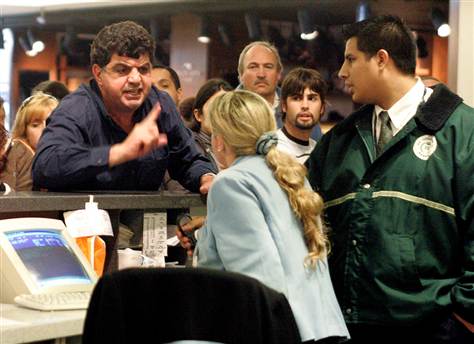Airline Codesharing: The Naked Truth

The Truth About Airline Codesharing
One of the prime examples of consumer confusion and pain is airline codesharing. Many of our Los Angeles Limo passengers have shared their recent experiences with us -as much out of frustration as confusion. One passenger recently booked a flight on Continental Airlines, but after the merger, it became a United Airlines flight. When he looked closer at his reservation, it said “Expressjet Airlines Inc. doing business as United Express” — two completely new airlines.
“Is that a codesharing flight?” he asked. “And if so, is it something I need to be worried about?”
Yes, it is. And yes, anyone who is concerned about transparency and consumer best practices should care about it.
Perhaps I can share our Limo passenger’s perspective on codesharing: It’s a lie.
Lack of Transparency
Airline spin doctors have done a pretty darn good job persuading regulators and the flying public that codesharing is good. They use vague catch phrases like “synergy” and guaranty customers nonexistent benefits.
If A traveler purchases a ticket on United Airlines, They expect to fly on United Airlines-not Expressjet or Volaris. If they wanted to fly on one of those airlines, They would have their travel agent book them on one of those flights, wouldn’t They?
Maybe my viewpoint is antiquated, but when I make a reservation at the Ritz Carlton I expect to stay in a building that says “Ritz Carlton” on it; when I rent a Hertz car, I expect to pick it up from an office that says “Hertz” on it; and when I buy a ticket on United Air Lines, I expect the plane to say “United Air Lines.”
Read the Small Print
The FAA has given the airline industry an artistic license to lie. When an airline does reveal a codeshare it’s almost nonexistent — more of an afterthought, in small print. The bottom line is that if an airline doesn’t have the resources or capability to operate the flight itself and has to outsource it to another competing company, then it should be plainly stated as such to the consumer.
With air travel, what you see ain’t always what you get. Yet one more reason to remember to read the fine print.
Basically what’s happening in the airline industry is that airlines are unequivocally lying by pretending other companies’ products are its own – It’s nothing more than a clever trick they call “codesharing”
Meet Mr. Smith
Let’s just call him “Mr. Smith”. He’s a regular Executive Limo client of ours that reserved a round-trip flight on American Airlines from New York to London. At least that’s what he thought.
In truth the flight was actually operated by American’s codeshare partner, British Airways. Mr. Smith had paid $120 for “preferred” seats, which on the AA.com site, looked pretty inviting.
“Then I got on the plane,” he said. “These preferred seats were behind the wall of a toilet. So for eight long hours I heard flushing, door opening and closing, people standing in line to get to the one of only two bathrooms in coach. I could not even sleep.”
On the American Airlines website, it didn’t make mention of the toilets. But on the British Airways site, he says, they were clearly highlighted, and he would have definitely not paid the additional upgrade cost for the seats.
That’s just one of the many nightmares of airline codesharing, which I choose to call an outright lie. Many airline apologists, say codesharing allows travelers to fly to more destinations, collect more award miles, and get better service.
Each of those arguments is arguably erroneous .
But before I get to that proving that, let me explain what occurred to Mr. Smith when he complained. He deduced that since some of the “benefits” of the AA preferred seat had gotten ‘lost in translation’, the airline would be happy to refund the $120 he’d paid.
He sent a simple, polite e-mail to the airline.
This was their response:
“While many customers have found this service to be a convenient option, we know that each of our customers values different parts of the overall travel experience, and all of our Your Choice travel services are optional,” it replied. “This allows us to keep our fares low, while offering the individual products and services that our customers value.”
American refused to refund the fee. “I feel deceived,” he said.
Top Worst Complaints with Codesharing
Three Codesharing Myths Busted
Before I Step down from my soap box, let me address a few of the myths surrounding codesharing
Myth: Codesharing allows you more access to more destinations.
Fact: Nope. The airline you’re booking a ticket with is still headed to the same number of cities. Its codeshare “partners” are servicing the remainder and allowing the airline “partner” to claim those destinations as its own. That is a lie.
Myth: Codesharing allows you to collect and redeem more award miles.
Fact: Seriously? Try redeeming your well deserved frequent-flier points for a flight and tell me how that works out for you. Unless you’re a master of adaptation or have an extensive knowledge base of programs and codeshare partnerships, you’re going to feel like a chump for having believed that argument. It’s meaningless lip service
Myth: Codesharing improves service.
Fact: Nope again!. Codesharing gives your airline license to offer sub-par service and then transfers the blame to an airline partner for its own gaff.
The Bottom line
Lying is wrong, even when airlines do it, and even when they say it’s for the good of their passengers-especially when they say it’s for the good of their passengers.
When government agencies sanction the airlines to fib… uh, I mean, codeshare, they do something very important. Something that travelers barely notice: They stop competing. Fewer competitors means a smaller market and fewer price options –great for airlines, not so much for travelers.
